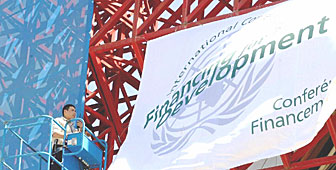US accused of hijacking Monterrey agenda

As the United Nations' first world summit on development aid opens in Mexico, critics say the United States' attitude has squashed any hope of progress.
With the world failing to implement an ambitious agenda for reducing poverty, set at a UN summit two years ago, and with attention focused instead on the US-led “war on terrorism”, the mood going into the conference in Monterrey is one of low expectations.
Monterrey is seen as a key stepping stone on the path to Johannesburg 2002, a major conference on sustainable development whose aim is to update the goals set at the Rio Earth Summit ten years ago.
“What happens in Monterrey will have a tremendous influence on Johannesburg,” Remo Gautschi, deputy director of Swiss Development and Cooperation Agency (SDC).
Failure foretold
Swiss non-governmental organisations say failure in Monterrey is a foregone conclusion. They say the final document – the Monterrey Consensus – has been so watered down as to be almost meaningless.
“No government is ready to reopen the agenda. In the so-called consensus paper, there are no clear obligations and no clear commitments,” says Bruno Gurtner, of the Swiss Coalition of Development Organisations, an umbrella grouping of NGOs.
While European Union countries have been divided over the issue of financing development, the blame, for many, lies squarely with the United States.
“The US has blocked many constructive proposals in earlier drafts. They have challenged every quantitative improvement of international development aid,” Gurtner told swissinfo. “The US is undermining multilateralism.”
Inflexible America
It is not only the NGOs that have been openly critical of Washington. Régis Avanthey, a senior SDC official, described the Americans as “inflexible” and accused them of “confiscating the debate”, suggesting that development issues were being pushed aside at the expense of the “war on terrorism”.
President George Bush announced a $5 billion development package in the run-up to Monterrey, though this aid is dependent on countries fulfilling a number of conditions. The US, which contributes just 0.1 per cent of its GDP to development aid, has made it clear it is not going to Monterrey to discuss figures.
On one issue the Swiss and Americans agree: development is not just a question of boosting aid. “We need to look at what we can do about the debt situation, what can we do to facilitate trade and private investment,” Gautschi says.
Realistic targets
The SDC official says it is perhaps not a bad thing that the draft final document sets modest goals.
“In many recent UN conferences, very ambitious targets have been set – targets that cannot be achieved. That’s counter-productive. We have to be realistic. Lets try to achieve the achievable,” Gautschi told swissinfo.
“Some people will be disappointed with the document, but what we have is the common denominator of all the positions. All the important themes are being discussed. We have to make the best of it,” he added.
It is generally recognised that, in the development field, Switzerland punches above its weight. Yet Swiss NGOs are critical of the government, saying that even though it makes the right noises, it has merely fallen into line with other countries.
Short arms and long pockets
At regular intervals over the past 30 years, industrialised countries have pledged to devote 0.7 per cent of GDP to development aid.
Only a small handful of countries – such as Denmark, Sweden and the Netherlands – manage that. In Switzerland, the federal government gives 0.33 per cent and has pledged to increase that to 0.4 per cent over the next ten years – a figure Bruno Gurtner says he doubts it will be able to meet.
Remo Gautschi says the SDC’s hands are tied: “Switzerland should do more. But in the end, we are part of a political system, and we can only work with the money the tax-payer provides.”
The NGOs argue that it is in the interests of the West to boost development aid, since cutting poverty would help to prevent war, terrorism, mass migration and disease.
In September 2000, at the UN Millennium Summit in New York, world leaders set themselves a number of ambitious development goals, including halving extreme poverty by 2015.
That now looks a pipedream. The UN Development Programme says none of the targets is likely to be met, given the crippling debt burden facing most developing countries and declining official development assistance in the West.
by Roy Probert

In compliance with the JTI standards
More: SWI swissinfo.ch certified by the Journalism Trust Initiative
You can find an overview of ongoing debates with our journalists here . Please join us!
If you want to start a conversation about a topic raised in this article or want to report factual errors, email us at english@swissinfo.ch.